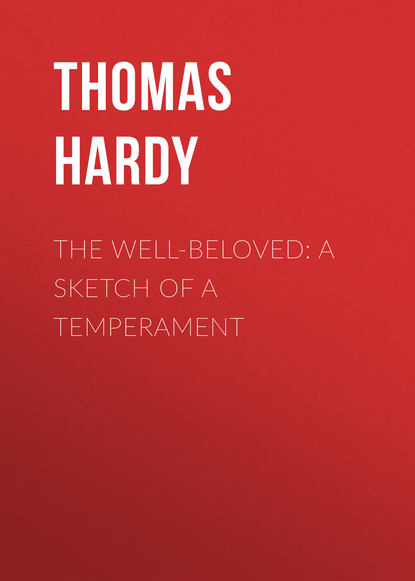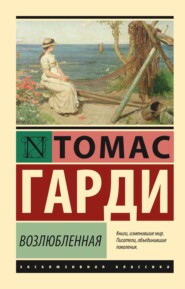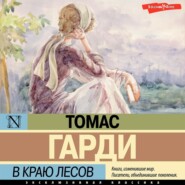По всем вопросам обращайтесь на: info@litportal.ru
(©) 2003-2025.
✖
The Well-Beloved: A Sketch of a Temperament
Настройки чтения
Размер шрифта
Высота строк
Поля
* * *
Such evening promenades as these were frequent during the waxing of that summer moon. On one occasion, as they were all good walkers, it was arranged that they should meet halfway between the island and the town in which Pierston had lodgings. It was impossible that by this time the pretty young governess should not have guessed the ultimate reason of these rambles to be a matrimonial intention; but she inclined to the belief that the widow rather than herself was the object of Pierston’s regard; though why this educated and apparently wealthy man should be attracted by her mother – whose homeliness was apparent enough to the girl’s more modern training – she could not comprehend.
They met accordingly in the middle of the Pebble-bank, Pierston coming from the mainland, and the women from the peninsular rock. Crossing the wooden bridge which connected the bank with the shore proper they moved in the direction of Henry the Eighth’s Castle, on the verge of the rag-stone cliff. Like the Red King’s Castle on the island, the interior was open to the sky, and when they entered and the full moon streamed down upon them over the edge of the enclosing masonry, the whole present reality faded from Jocelyn’s mind under the press of memories. Neither of his companions guessed what Pierston was thinking of. It was in this very spot that he was to have met the grandmother of the girl at his side, and in which he would have met her had she chosen to keep the appointment, a meeting which might – nay, must – have changed the whole current of his life.
Instead of that, forty years had passed – forty years of severance from Avice, till a secondly renewed copy of his sweetheart had arisen to fill her place. But he, alas, was not renewed. And of all this the pretty young thing at his side knew nothing.
Taking advantage of the younger woman’s retreat to view the sea through an opening of the walls, Pierston appealed to her mother in a whisper: ‘Have you ever given her a hint of what my meaning is? No? Then I think you might, if you really have no objection.’
Mrs. Pierston, as the widow, was far from being so coldly disposed in her own person towards her friend as in the days when he wanted to marry her. Had she now been the object of his wishes he would not have needed to ask her twice. But like a good mother she stifled all this, and said she would sound Avice there and then.
‘Avice, my dear,’ she said, advancing to where the girl mused in the window-gap, ‘what do you think of Mr. Pierston paying his addresses to you – coming courting, as I call it in my old-fashioned way. Supposing he were to, would you encourage him?’
‘To ME, mother?’ said Avice, with an inquiring laugh. ‘I thought – he meant you!’
‘O no, he doesn’t mean me,’ said her mother hastily. ‘He is nothing more than my friend.’
‘I don’t want any addresses,’ said the daughter.
‘He is a man in society, and would take you to an elegant house in London suited to your education, instead of leaving you to mope here.’
‘I should like that well enough,’ replied Avice carelessly.
‘Then give him some encouragement.’
‘I don’t care enough about him to do any encouraging. It is his business, I should think, to do all.’
She spoke in her lightest vein; but the result was that when Pierston, who had discreetly withdrawn, returned to them, she walked docilely, though perhaps gloomily, beside him, her mother dropping to the rear. They came to a rugged descent, and Pierston took her hand to help her. She allowed him to retain it when they arrived on level ground.
Altogether it was not an unsuccessful evening for the man with the unanchored heart, though possibly initial success meant worse for him in the long run than initial failure. There was nothing marvellous in the fact of her tractability thus far. In his modern dress and style, under the rays of the moon, he looked a very presentable gentleman indeed, while his knowledge of art and his travelled manners were not without their attractions for a girl who with one hand touched the educated middle-class and with the other the rude and simple inhabitants of the isle. Her intensely modern sympathies were quickened by her peculiar outlook.
Pierston would have regarded his interest in her as overmuch selfish if there had not existed a redeeming quality in the substratum of old pathetic memory by which such love had been created – which still permeated it, rendering it the tenderest, most anxious, most protective instinct he had ever known. It may have had in its composition too much of the boyish fervour that had characterized such affection when he was cherry-cheeked, and light in the foot as a girl; but, if it was all this feeling of youth, it was more.
Mrs. Pierston, in fearing to be frank, lest she might seem to be angling for his fortune, did not fully divine his cheerful readiness to offer it, if by so doing he could make amends for his infidelity to her family forty years back in the past. Time had not made him mercenary, and it had quenched his ambitions; and though his wish to wed Avice was not entirely a wish to enrich her, the knowledge that she would be enriched beyond anything that she could have anticipated was what allowed him to indulge his love.
He was not exactly old he said to himself the next morning as he beheld his face in the glass. And he looked considerably younger than he was. But there was history in his face – distinct chapters of it; his brow was not that blank page it once had been. He knew the origin of that line in his forehead; it had been traced in the course of a month or two by past troubles. He remembered the coming of this pale wiry hair; it had been brought by the illness in Rome, when he had wished each night that he might never wake again. This wrinkled corner, that drawn bit of skin, they had resulted from those months of despondency when all seemed going against his art, his strength, his happiness. ‘You cannot live your life and keep it, Jocelyn,’ he said. Time was against him and love, and time would probably win.
‘When I went away from the first Avice,’ he continued with whimsical misery, ‘I had a presentiment that I should ache for it some day. And I am aching – have ached ever since this jade of an Ideal learnt the unconscionable trick of inhabiting one image only.’
Upon the whole he was not without a bodement that it would be folly to press on.
IV. A DASH FOR THE LAST INCARNATION
This desultory courtship of a young girl which had been brought about by her mother’s contrivance was interrupted by the appearance of Somers and his wife and family on the Budmouth Esplanade. Alfred Somers, once the youthful, picturesque as his own paintings, was now a middle-aged family man with spectacles – spectacles worn, too, with the single object of seeing through them – and a row of daughters tailing off to infancy, who at present added appreciably to the income of the bathing-machine women established along the sands.
Mrs. Somers – once the intellectual, emancipated Mrs. Pine-Avon – had now retrograded to the petty and timid mental position of her mother and grandmother, giving sharp, strict regard to the current literature and art that reached the innocent presence of her long perspective of girls, with the view of hiding every skull and skeleton of life from their dear eyes. She was another illustration of the rule that succeeding generations of women are seldom marked by cumulative progress, their advance as girls being lost in their recession as matrons; so that they move up and down the stream of intellectual development like flotsam in a tidal estuary. And this perhaps not by reason of their faults as individuals, but of their misfortune as child-rearers.
The landscape-painter, now an Academician like Pierston himself – rather popular than distinguished – had given up that peculiar and personal taste in subjects which had marked him in times past, executing instead many pleasing aspects of nature addressed to the furnishing householder through the middling critic, and really very good of their kind. In this way he received many large cheques from persons of wealth in England and America, out of which he built himself a sumptuous studio and an awkward house around it, and paid for the education of the growing maidens.
The vision of Somers’s humble position as jackal to this lion of a family and house and studio and social reputation – Somers, to whom strange conceits and wild imaginings were departed joys never to return – led Pierston, as the painter’s contemporary, to feel that he ought to be one of the bygones likewise, and to put on an air of unromantic bufferism. He refrained from entering Avice’s peninsula for the whole fortnight of Somers’s stay in the neighbouring town, although its grey poetical outline – ‘throned along the sea’ – greeted his eyes every morn and eve across the roadstead.
When the painter and his family had gone back from their bathing holiday, he thought that he, too, would leave the neighbourhood. To do so, however, without wishing at least the elder Avice good-bye would be unfriendly, considering the extent of their acquaintance. One evening, knowing this time of day to suit her best, he took the few-minutes’ journey to the rock along the thin connecting string of junction, and arrived at Mrs. Pierston’s door just after dark.
A light shone from an upper chamber. On asking for his widowed acquaintance he was informed that she was ill, seriously, though not dangerously. While learning that her daughter was with her, and further particulars, and doubting if he should go in, a message was sent down to ask him to enter. His voice had been heard, and Mrs. Pierston would like to see him.
He could not with any humanity refuse, but there flashed across his mind the recollection that Avice the youngest had never yet really seen him, had seen nothing more of him than an outline, which might have appertained as easily to a man thirty years his junior as to himself, and a countenance so renovated by faint moonlight as fairly to correspond. It was with misgiving, therefore, that the sculptor ascended the staircase and entered the little upper sitting-room, now arranged as a sick-chamber.
Mrs. Pierston reclined on a sofa, her face emaciated to a surprising thinness for the comparatively short interval since her attack. ‘Come in, sir,’ she said, as soon as she saw him, holding out her hand. ‘Don’t let me frighten you.’
Avice was seated beside her, reading. The girl jumped up, hardly seeming to recognize him. ‘O! it’s Mr. Pierston,’ she said in a moment, adding quickly, with evident surprise and off her guard: ‘I thought Mr. Pierston was – ’
What she had thought he was did not pass her lips, and it remained a riddle for Jocelyn until a new departure in her manner towards him showed that the words ‘much younger’ would have accurately ended the sentence. Had Pierston not now confronted her anew, he might have endured philosophically her changed opinion of him. But he was seeing her again, and a rooted feeling was revived.
Pierston now learnt for the first time that the widow had been visited by sudden attacks of this sort not infrequently of late years. They were said to be due to angina pectoris, the latter paroxysms having been the most severe. She was at the present moment out of pain, though weak, exhausted, and nervous. She would not, however, converse about herself, but took advantage of her daughter’s absence from the room to broach the subject most in her thoughts.
No compunctions had stirred her as they had her visitor on the expediency of his suit in view of his years. Her fever of anxiety lest after all he should not come to see Avice again had been not without an effect upon her health; and it made her more candid than she had intended to be.
‘Troubles and sickness raise all sorts of fears, Mr. Pierston,’ she said. ‘What I felt only a wish for, when you first named it, I have hoped for a good deal since; and I have been so anxious that – that it should come to something! I am glad indeed that you are come.’
‘My wanting to marry Avice, you mean, dear Mrs. Pierston?’
‘Yes – that’s it. I wonder if you are still in the same mind? You are? Then I wish something could be done – to make her agree to it – so as to get it settled. I dread otherwise what will become of her. She is not a practical girl as I was – she would hardly like now to settle down as an islander’s wife; and to leave her living here alone would trouble me.’
‘Nothing will happen to you yet, I hope, my dear old friend.’
‘Well, it is a risky complaint; and the attacks, when they come, are so agonizing that to endure them I ought to get rid of all outside anxieties, folk say. Now – do you want her, sir?’
‘With all my soul! But she doesn’t want me.’
‘I don’t think she is so against you as you imagine. I fancy if it were put to her plainly, now I am in this state, it might be done.’
They lapsed into conversation on the early days of their acquaintance, until Mrs. Pierston’s daughter re-entered the room.
‘Avice,’ said her mother, when the girl had been with them a few minutes. ‘About this matter that I have talked over with you so many times since my attack. Here is Mr. Pierston, and he wishes to be your husband. He is much older than you; but, in spite of it, that you will ever get a better husband I don’t believe. Now, will you take him, seeing the state I am in, and how naturally anxious I am to see you settled before I die?’
‘But you won’t die, mother! You are getting better!’
‘Just for the present only. Come, he is a good man and a clever man, and a rich man. I want you, O so much, to be his wife! I can say no more.’
Avice looked appealingly at the sculptor, and then on the floor. ‘Does he really wish me to?’ she asked almost inaudibly, turning as she spoke to Pierston. ‘He has never quite said so to me.’
‘My dear one, how can you doubt it?’ said Jocelyn quickly. ‘But I won’t press you to marry me as a favour, against your feelings.’
‘I thought Mr. Pierston was younger!’ she murmured to her mother.
‘That counts for little, when you think how much there is on the other side. Think of our position, and of his – a sculptor, with a mansion, and a studio full of busts and statues that I have dusted in my time, and of the beautiful studies you would be able to take up. Surely the life would just suit you? Your expensive education is wasted down here!’
Avice did not care to argue. She was outwardly gentle as her grandmother had been, and it seemed just a question with her of whether she must or must not. ‘Very well – I feel I ought to agree to marry him, since you tell me to,’ she answered quietly, after some thought. ‘I see that it would be a wise thing to do, and that you wish it, and that Mr. Pierston really does – like me. So – so that – ’

















